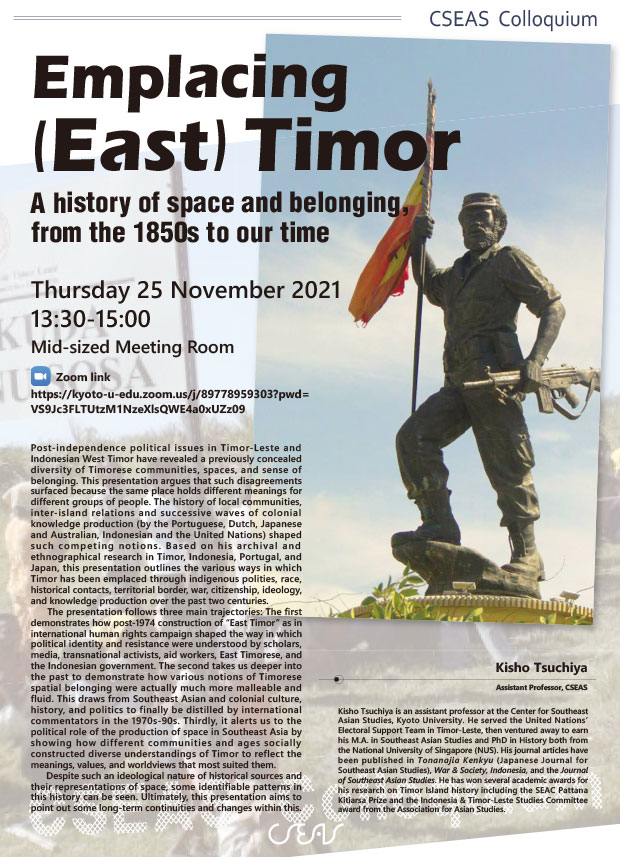Date & Time: Thursday 25 November, 2021, 13:30-15:00
Zoom Link :
https://kyoto-u-edu.zoom.us/j/89778959303?pwd=VS9Jc3FLTUtzM1NzeXlsQWE4a0xUZz09
Title: Emplacing (East) Timor: A history of space and belonging, from the 1850s to our time
Speaker: Kisho Tsuchiya
Post-independence political issues in Timor-Leste and Indonesian West Timor have revealed a previously concealed diversity of Timorese communities, spaces, and sense of belonging. This presentation argues that such disagreements surfaced because the same place holds different meanings for different groups of people. The history of local communities, inter-island relations and successive waves of colonial knowledge production (by the Portuguese, Dutch, Japanese and Australian, Indonesian and the United Nations) shaped such competing notions. Based on his archival and ethnographical research in Timor, Indonesia, Portugal, and Japan, this presentation outlines the various ways in which Timor has been emplaced through indigenous polities, race, historical contacts, territorial border, war, citizenship, ideology, and knowledge production over the past two centuries.
The presentation follows three main trajectories: The first demonstrates how post-1974 construction of “East Timor” as in international human rights campaign shaped the way in which political identity and resistance were understood by scholars, media, transnational activists, aid workers, East Timorese, and the Indonesian government. The second takes us deeper into the past to demonstrate how various notions of Timorese spatial belonging were actually much more malleable and fluid. This draws from Southeast Asian and colonial culture, history, and politics to finally be distilled by international commentators in the 1970s-90s. Thirdly, it alerts us to the political role of the production of space in Southeast Asia by showing how different communities and ages socially constructed diverse understandings of Timor to reflect the meanings, values, and worldviews that most suited them.
Despite such an ideological nature of historical sources and their representations of space, some identifiable patterns in this history can be seen. Ultimately, this presentation aims to point out some long-term continuities and changes within this.
Bio:
Kisho Tsuchiya is an assistant professor at the Center for Southeast Asian Studies, Kyoto University. He served the United Nations’ Electoral Support Team in Timor-Leste, then ventured away to earn his M.A. in Southeast Asian Studies and PhD in History both from the National University of Singapore (NUS). His journal articles have been published in Tonanajia Kenkyu (Japanese Journal for Southeast Asian Studies), War & Society, Indonesia, and the Journal of Southeast Asian Studies. He has won several academic awards for his research on Timor Island history including the SEAC Pattana Kitiarsa Prize and the Indonesia & Timor-Leste Studies Committee award from the Association for Asian Studies.
